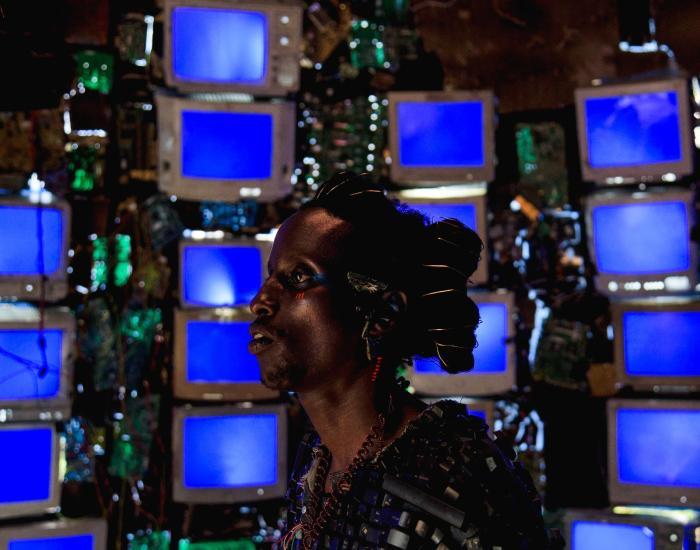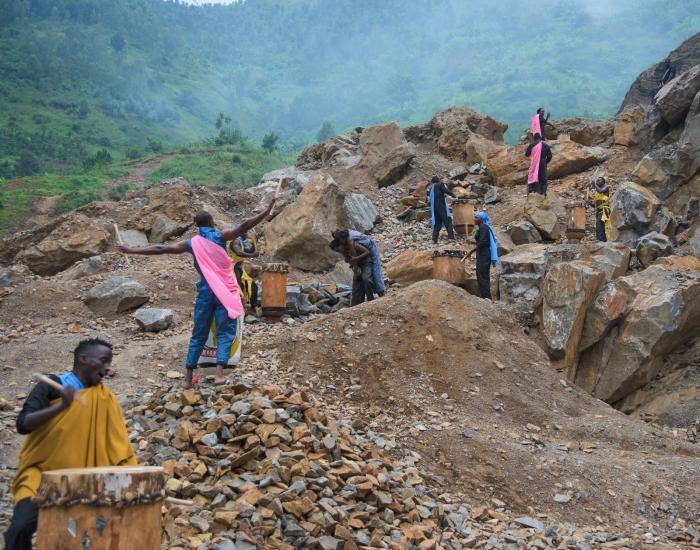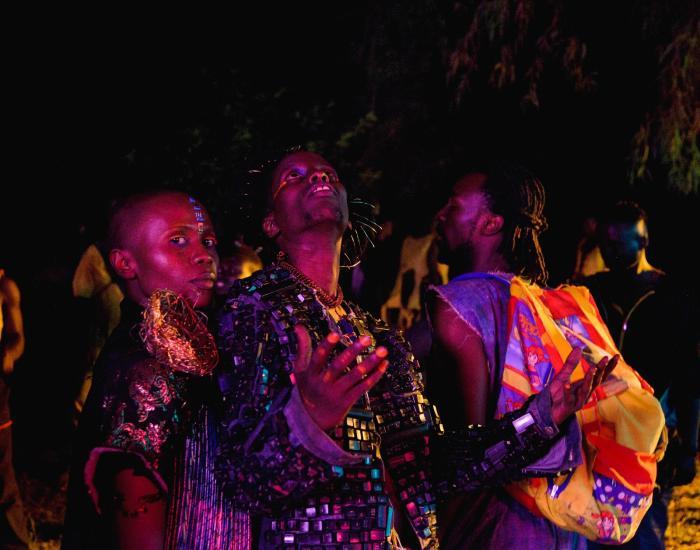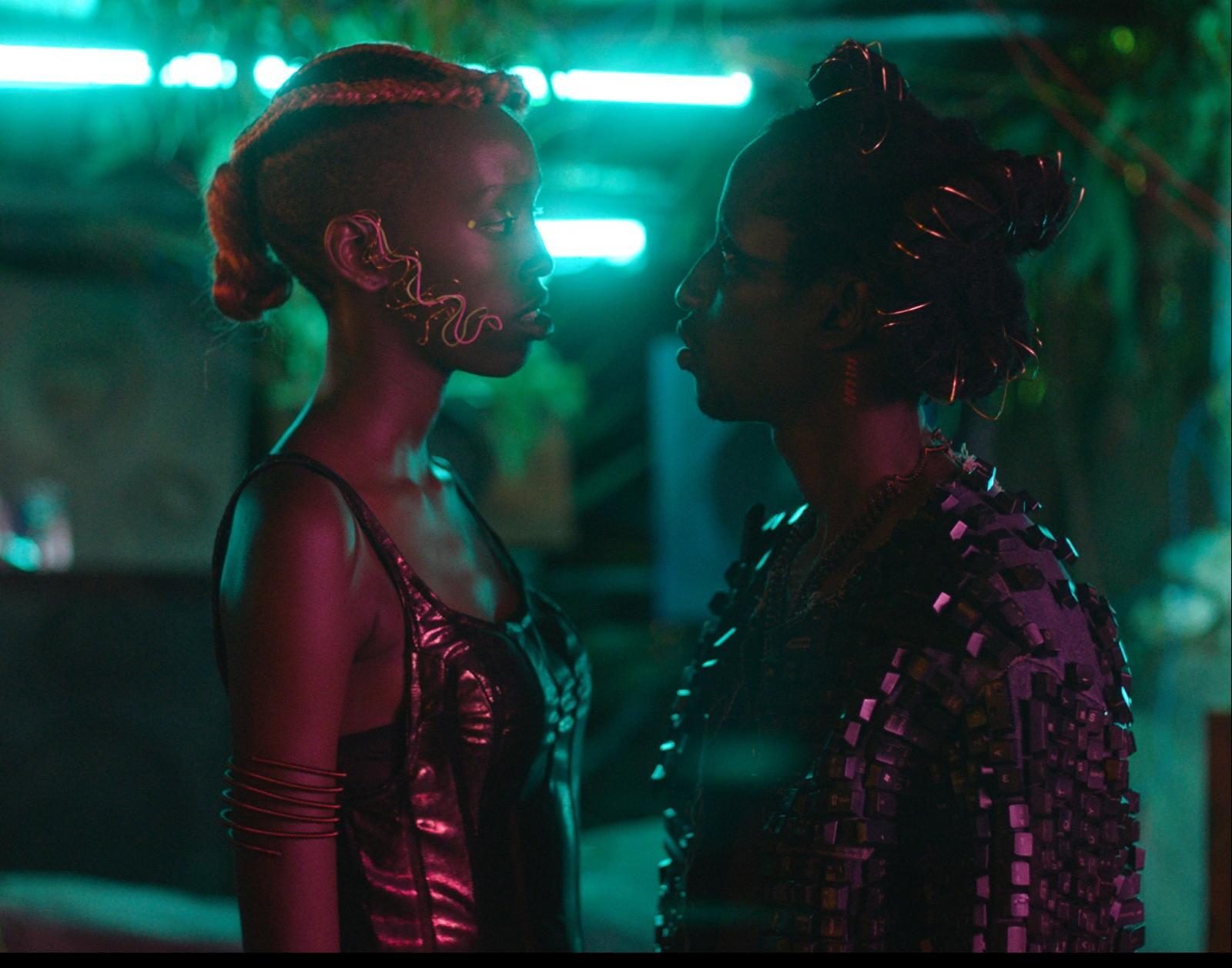Neptune Frost: A magnetic creation to treasure
Our Programming and Marketing trainee Sanaa tells us why you should see Neptune Frost this weekend.
Directors Anisia Uzeyman and Saul Williams, one of the most talented couples to cross music, poetry, and film, have combined their artistry to create the magnetically bold feature Neptune Frost.
Set in the hilltops of the East African nation of Burundi, a group of escaped coltan miners in an otherworldly e-waste dump attempt a takeover of the authoritarian regime exploiting the region’s natural resources - and its people. An intersex runaway, Neptune, and an escaped miner’s connection sparks glitches within the greater divine circuitry. Set between states of being – past and present, dream and waking life, colonised and free, male and female, memory and prescience, Neptune Frost is an invigorating and empowering call to reclaim technology for progressive political ends.

Together, co-directors Uzeyman and Williams captured concerns stemming from working in Senegal in 2011, a time of anti-government protests with The Arab Spring, the exploitation of workers, anti-gay laws across the African continent, and WikiLeaks.
Without preaching or being deemed as miserabilist, their luminous style of storytelling is a considered approach based on their experiences of hearing about hackers with names like Gucci fur and asking, where does our tech go to die?
A prominent moment in the co-directors’ conception of Neptune Frost was learning about E-waste camps and the mining of coltan - the special mineral used to make our smartphones and laptops. My own personal take is that it speaks to the power we each hold. The juxtaposition of seeing children in Senegal playing on traditional drums whilst carrying Beats headphones, helped them to create a landscape fused with music and the notion of freedom. In seeing the drum as the first form of wireless connection, they connected the dots between new and ancient technology.

Originally planned as a musical stage play and graphic novel, MartyrLoserKing, in 2014 producers showed interest in making a film, and Uzeyman and Williams’s creative experiences helped the process. As a musician, poet, and actor from New York, Saul Williams was asked to write poems on Black History Month for Nickelodeon, and found himself unable to stop and so it turned into this sci-fi punk project.
When the protests in Burundi became unsafe, some of the drummers featured in the film moved to Rwanda but first met Williams and Uzeman when they’d go and see their performances in 2016. Saul’s writing for Neptune Frost included their stories of how their radio and television was cut, and then internet locked down. In finding the voice of the characters, first came discovering the land’s musical soundscape. At times cradling you through its melodic sphere and at others, lending its energy with each line and movement. In order to tell its story in the most dazzling way, as Williams explains, was with thanks to its powerful community of collaborators:
“For me, one of the biggest things about realising that a film was possible, was the realisation that a film is collaborative.”
Anisia Uzeyman is a Rwandan actor, filmmaker, and playwright who as well as being co-director, was also the director of photography. Instead of using money to rent and fly in cinema equipment from another country, Uzeyman worked with a group of engineers in Rwanda. She visited LED factories and together built the lights, rails and dollys with Chris Schwagga.
What feels evident is that after years of devoted research, learning and craftmanship, stories told, sounds recorded, the colour palettes in all the lookbooks have come to life on screen for us, with thanks to a Rwandan and Burdundian crew, who are all amazing artists in their own right.

Cedric Mizero is a Rwandan costume and set designer who selected his own crew of artists to help him build the village of recycled computer parts, costumes and jewellery. At twenty-five years old. Lady Soulfly (Tanya Melendez) worked on the magnificent hair and makeup. Safali Eugene and Blake Leyh were part of the superb sound department. Actors, poets, singers, and choreographers are all part of a glowing scene in Rwanda.
“For me there is that beautiful feeling that I have with a film that we were able to film in Rwanda and to film those actors and to also bring Rwanda here is what film can do, and it’s very beautiful for me.” - Anisia Uzeyman, director
“For all of us. There’s a lot to be inspired by [in] Rwanda” - Saul Williams, director
And there’s also a lot to be inspired by in each of you.
Five languages are spoken in Neptune Frost: Kinyarwanda, Kirundi, French, English and Swahili "to reflect how the actors and people in that region of the African continent communicate utilising all of those languages, which is a reflection of migration. To me, that’s more exciting than hearing everybody in a fake accent speaking in English because it’ll sell better." And I appreciate his candour:
“You can’t have the film in Kinyarwanda!
Do you know how many people that’s alienating!?
And I’m like, do you know how many people will get
to hear Kinyarwanda for the first time!?”
From a film programming standpoint (and just, general human being), director Saul Williams highlights an industry’s exclusive need to have a famous name to sell a film vs underestimating the audience. Does the trailer or word-of-mouth pique your interest enough that it doesn’t matter there’s no one you’ve heard of in it? After watching the film, how different would it have been if there were household names? One of the biggest cosmic feats of the production was that filming began on February 3, 2020 and finished just four days before Rwanda was on lockdown on March 8, 2020 due to Covid-19. Though discombobulating, it remains richly dynamic throughout, making it even more of an illustrious gem of the times.
As Saul champions, the significance in ‘the possibility of talking about the things we deem important in public spaces and being heard, having those things acknowledged’ being shown by Uzeyman and Williams with such multi-layered thought in Neptune Frost was frankly so impressive, it made me as a film exhibition trainee smile like it was a bold beacon for a better represented industry to come.
Neptune Frost is showing at Broadway from Friday 18 - Sunday 20 November.
